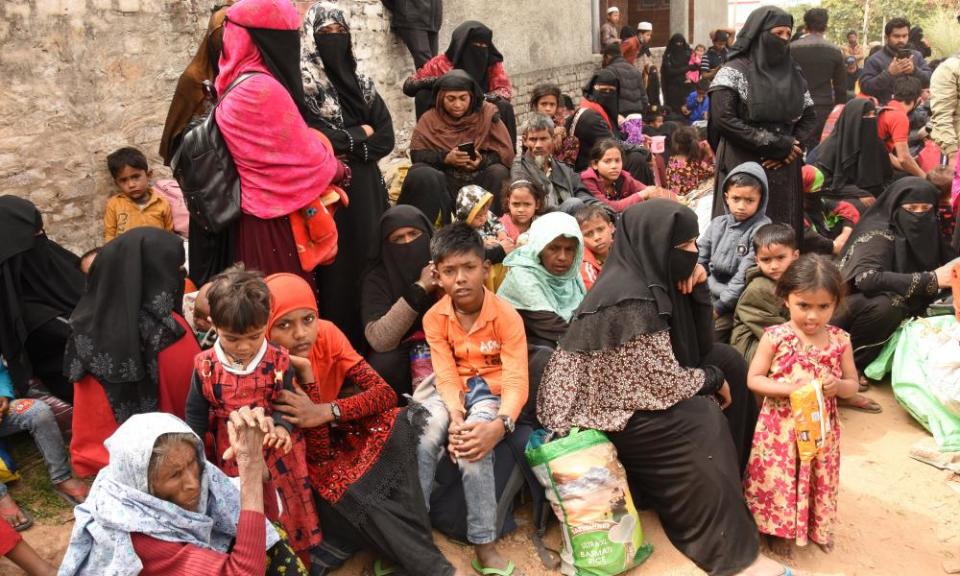India detains Rohingya refugees and threatens to deport them to Myanmar

About 170 Rohingya refugees living in India have been rounded up into detention centres and told they will be forcibly deported back to Myanmar where they had previously fled genocidal human rights abuses.
The mass detentions, which began in the city of Jammu in Kashmir over the weekend, are part of a wider nationwide crackdown against Rohingya Muslims, who number about 40,000 in India. Many hold registered United Nations high commissioner for refugees (UNHCR) refugee ID cards, which are supposed to offer protection from arbitrary detention.
On Saturday, hundreds of Rohingya including women and children were summoned by police as a part of a “verification” exercise and others were picked up during raids on camps on the outskirts of Jammu city where about 5,000 Rohingya live.
They were taken in buses to a jail in nearby Hiranagar, which police described as a “holding centre”. Proceedings have begun for their deportation back to Myanmar, which is in the midst of a coup and where the Rohingya remain a heavily persecuted minority.
Akram Mohammad was among those detained on Saturday, after he, his wife, Amina, and their three children were summoned to a local stadium by the police. The police and paramilitary banned them from leaving and then in the afternoon they began calling out names.
Related: Where were the protesters when the Rohingya were being murdered? | Kenan Malik
His wife, Amina, 28, said: “I have small kids: where will I go? What crime has my husband committed?. We came here in 2012 fleeing the brutal violence in our country. My husband was working as a labourer here and we all have identity cards of UNHCR. This is oppression.”
Aizu Rahaman, a refugee in Jammu, said his uncle, son and brother’s wife were sent to jail because they could not produce a Myanmar passport or Indian visa. “Police said, ‘you are illegal immigrants’ and arrested them,” said Rahaman. “Almost all Rohingya, including my three relatives, showed their valid UNHCR-issued refugee ID cards. But police told us those cards cannot save the Rohingya. They are of no use in India.”
Witnesses allege that during the raids on the camps, one Rohingya refugee was beaten by police when he tried to resist arrest.
Many of the refugees have been living in India since 2008, when they fled their home country following a brutal outbreak of violence at the hands of the Myanmar military. In 2012 and then 2017, the numbers of Rohingya in India swelled again after further campaigns of violence.
Most ended up in camps in Cox’s Bazar in Bangladesh, but tens of thousands have also sought safety in India over the past decade, where they have set up established communities.
Since the Hindu nationalist Bharatiya Janata party (BJP) came to power in 2014, there has been a rise in negative sentiment and violence against the Rohingya Muslims. In Jammu in 2017, local BJP leaders launched a campaign demanding the expulsion of all Rohingya from the region.
This most recent crackdown began earlier this year in the state of West Bengal when officials claimed that Rohingya were illegally becoming citizens of India. The West Bengal state elections will be held this month, and the BJP have made it an election promise to deport the Rohingya if they win.
Following threats that more arrests were to come, in Jammu on Sunday hundreds of desperate Rohingya, many carrying water bottles, sacks full of clothes and tiffin boxes of food, began marching out of the city in search of safety. However, they were surrounded by police and paramilitary personnel and pushed back into the camps. Others fled to the woods.
Mukesh Singh, the local police inspector general, said: “After nationality verification of these illegal immigrants, details will be sent to the ministry of external affairs in Delhi to be taken up with Myanmar for their deportation.”
Rohingya activists said that deporting people back to Myanmar was like “throwing us into hell”.
Aayutullah, a 35 year-old refugee who lives in a camp in the Narwal area of Jammu, said: “We have been living here for a decade. We have UNHCR cards. I have set up a garment shop for living. How did we suddenly become illegal? Our people are working hard to earn their livelihood. We are not a burden on anyone. Then why this inhuman treatment?”
Prashant Bhushan, a lawyer, said the crackdown was in violation of international law because the Rohingya had fled genocidal violence.
“These are refugees here. The government can neither detain them nor evict them. They have to be allowed to live as refugees,” said Bushan, who plans to file an application in the supreme court of India seeking the release of the detained refugees.
The arrests sent ripples of fear through the Rohingya communities scattered across India. Since January, almost all of the 400 Rohingya refugees living in West Bengal have disappeared from their villages, many crossing over the border.
Among them was Mohammad Nijam, a Rohingya refugee who was living in a West Bengal village, who crossed over to Bangladesh with his wife and three children in February.
“India has become unsafe for all Rohingya,” he said. “I think all Rohingya living in India will have to flee the country for Bangladesh or other countries very soon.”
Shaikh Azizur Rahman contributed reporting from West Bengal

 Yahoo Finance
Yahoo Finance 